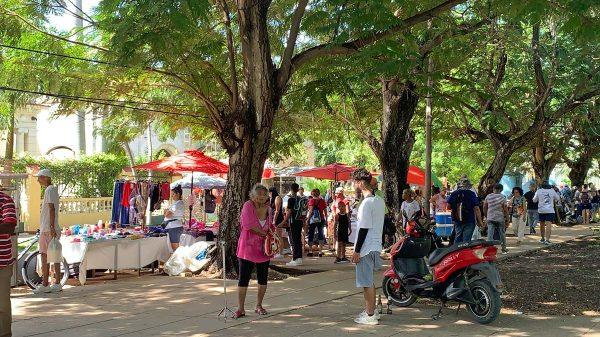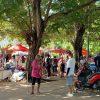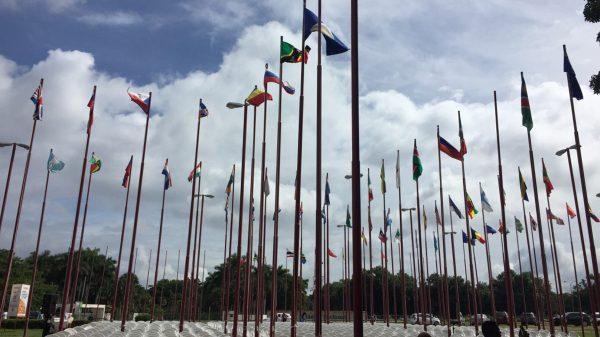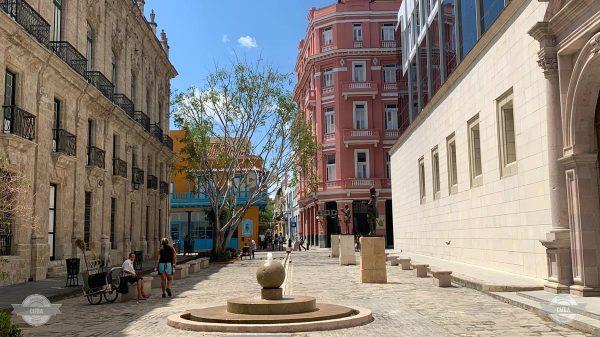Juan Triana Cordoví, is a senior professor at the Center for the Study of the Cuban Economy, University of Havana. He spoke with us on the eve before voters in Georgia headed to the polls in crucial Senate runoffs in the United States.
In this interview, Mr. Triana discusses the Cuban economy, the devastating effects of Covid on his homeland, exports, recent regulatory changes and foreign investment.
Since 1982, Mr. Triana is an invited professor at the Higher Institute of International Relations of the Ministry of Foreign Affairs of Cuba in Havana.
Dr. Triana holds a Bachelors in Economics, a Masters in Cuban and Latin American Studies, and a PhD in Economy from the University of Havana. He also has a Diploma in Planning Policies and Agricultural Development from the FAO-PROCAPLAN, UN, Buenos Aires.
He is an internationally published author of more than 25 books as coauthor and numerous articles on strategies for economic change, opportunities, challenges, perspectives, reflections on economic matters pertaining to Cuba.
Professor Triana has also lectured at more than a dozen universities outside of Cuba including the University of London, University of Nottingham, Universidad de Barcelona, University of Wolverhampton, Institute of the Sorbonne University, Columbia University, University of Minnesota, Kellogg Institute, University of Notre Dame, Florida International University, University of Denver, University of Oviedo, Hankuk University and Seoul University.
In 1997, Dr. Triana was awarded for Economics by the Ministry of Science, Technology and the Environment (CITMA). He was a four times winner as coauthor for “Best book in Economy” from the National Social Sciences Prize from the CITMA. In 2002, Dr. Triana was winner of the Raúl León Torras National Economics Prize from the National Association of Economists of Cuba.
Between 1995-2004, Dr. Triana was Director at the Center for the Study of the Cuban Economy, University of Havana. He has also held a variety of positions as an consultant to international corporations, a member of various committees, host of the Radio Taino program on the Cuban economy and is a contributor to various online news media websites.
Cuba Business Report: To begin with, the Covid pandemic has had a disastrous effect on the world’s economy. The World Bank has predicted a 5.2 percent contraction in global GDP this year, and the deepest global recession in decades. Can you give us an overall idea of how this pandemic has affected the Cuban economy? What does this reveal about the state of the economy?
Professor Juan Triana:
As in the rest of the world, the COVID pandemic has hit the Cuban economy very hard. The data on the quarterly behavior of the economy demonstrates this. As of March 2020, the date that Cuba faced the first wave of the disease, the dynamics of the economy plummeted. The graph below shows that drop.

Cuba also had to spend more than 100 million additional dollars on the entire program to contain the disease, while expenditures from the budget also rose, raising the fiscal pressure and deficit.
It must also be understood that the effect of the pandemic was greater since the Cuban economy had already been facing a fall in its economic dynamics since the second quarter of 2019, partly as a result of the increase in the United States blockade and partly due to a combination of problems conjunctural and structural, long-standing the latter.
However, the pandemic also forced a search for new alternatives and revealed important reserves:
The first, allowed to verify the solidity of the Cuban health system and the biotechnology pharmaceutical sector. Secondly, it showed that it was possible to readjust a job and develop teleworking and working from home. Thirdly, it made evident the importance of telecommunications, the network, and developing services associated with it.
It highlighted the strategic importance of the food production system and the profound weaknesses it still suffers. It demonstrated the vitality and creativity of the non-state sector and its great capacity to adapt to these new conditions. It confirmed that it is essential to achieve greater complementarity between all economic agents regardless of the form of ownership and forced to accelerate and deepen the reforms announced years before and highlighted the importance of supporting government measures with the work of the academic and scientific centers.
The currency changes which took effect on January 1, what effects will this have on the economy?
Professor Triana:
Like any monetary reform that has at its center the devaluation of the official exchange rate, it has short and long-term effects.
In the short term, it is intended to eliminate monetary distortions that impact the measurement of efficiency, productivity, and profitability of companies. In the short term, its immediate effect will be an upward price readjustment, as well as the cost structures of the economic agents and the spending structure of families.
Also in the short term, it should have an impact on the reduction of imports and on the preference of Cuban companies to buy domestically produced products. In the same way, it must generate incentives to seek employment.
In the medium and long term, if the devaluation occurs as it should, it should have positive effects on efficiency, labor productivity, and exports. However, other structural factors must be combined for this to occur.
Cuba has made several reforms (including the change to a single currency). What will the impact of these changes be for foreign investors?
Professor Triana:
Cuban authorities have argued that they will prevent these changes from negatively impacting joint ventures and 100 percent foreign companies operating in the country.
The unification of the exchange rate and the monetary unification has meant a devaluation of the official rate and this should benefit foreign investors:
- Because a dollar or a euro will yield more, while all payments will be made in CUP at the rate of 1 USD for 24 CUP. For example, in the case of hiring the workforce, the foreign investor should benefit.
- Companies can buy national supplies at a much more favorable prices than imports. Before, companies had to pay the prices of these inputs one to one.
- The rates of some services previously paid in dollars will now be paid in national currency. Of course, not everything will be a profit, now imports will cost more.
What are the expectations for trade and investment under the new Biden presidency?
Professor Triana:
I can only speak about my expectations, I don’t know what the government’s are.
I do not believe that in the first months Cuba occupies a privileged place on the Biden-Harris agenda. Also keep in mind that the Senate is still undecided, whether the vote in Georgia is pro-Democrat or contrary should have a significant influence on the breadth and depth of what Biden-Harris will be able to do.
One last consideration. For the Democrats, keeping the seat in the White House in the next term is essential and for this, Florida continues to be important. This factor will have weight.
However, I believe that the new president will be able to reverse some of the measures adopted by Trump, especially those that have to do with contacts between the Cuban community living in the United States and their relatives in Cuba.
Travel and remittances could be among the first measures to change. Reactivating the visa granting service at the US consulate in Cuba could be another measure.
To facilitate again the tourism of Americans to Cuba, as well as some other measures that do not depend on negotiations between the executive and Congress. Reversing the measures taken by President Trump against Cuban companies and banks seems more difficult, not only because they are more complex and manipulable by the Republicans, but also because today they constitute a resource to “negotiate” with Cuba.
Promote trade and investment of American companies in Cuba under Specific licenses will depend more on the pressure of these American companies and the balance of costs and benefits for the future Democrat in the White House. I’m not that optimistic. But as for the environment for trade and investment in Cuba, undoubtedly a more relaxed relationship between the United States and Cuba will have a positive effect.
What are the strongest sectors that will drive success for the Cuban economy?
Professor Triana:
Right now, medical services is the most powerful of all. Turning Cuba into a destination to receive these services seems possible.
Obviously, tourism, although it is clear it requires profound transformations to adapt not only to a post-covid world but also to the new conditions of the national economy. Tourism, taking advantage of these new conditions, can significantly increase its multiplier effect on the rest of the economy. It has and will have a very large impact on the non-state sector, both in terms of employment and income.
Biotech pharmaceuticals are among the most powerful of all. Cuba must take advantage of what has been advanced this year in the work of drug production to face COVID. The production of some agricultural products, especially with the Caribbean and Canadian markets in mind, although requires a strong process of technological improvement and learning in commercial and regulatory terms.
There are other traditional sectors already known, the production of tobacco and Habanos cigars, rums, sugar, nickel and other metals.
But you also have to think that many small things can build something very large. Cuba has undeniable potential in its citizens. The reform that has begun is opening up opportunities for the creation of small and medium-sized companies, with a greater or lesser degree of complexity that can also, together, become a great engine of economic growth and employment.
Professor Triana, it was a pleasure speaking with you on Cuba’s economy. Thank you for taking this time with us today.

T.K. Hernández is co-founder and editor at Cuba Business Report. Her work has been published in various online news media publications. Hernández has supported fundraising for Cuba’s last two hurricane disaster relief campaigns and is a member of the Canadian Network on Cuba. She is also a member of The Writers Union of Canada, and ACES International Alliance of Editors. Ms. Hernández is the author of three books, most recently, “The Cuba Interviews: Conversations on Foreign Investment and Economic Development,” (Palgrave Macmillan, 2023).













